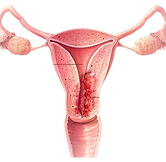Uterine Cancer
Home > Uterine Cancer

Uterine cancer, also known as endometrial cancer, is a type of cancer that develops in the lining of the uterus (the endometrium). It is the most common type of cancer that affects the female reproductive system.
Causes:
The exact cause of uterine cancer is not known, but there are several risk factors that can increase a woman’s chances of developing the disease, including:
- Obesity
- Diabetes
- High blood pressure
- Hormonal imbalances (such as estrogen dominance)
- Starting menstruation at a young age or reaching menopause at an older age
- Not having children
- Having a family history of uterine or ovarian cancer
- Taking tamoxifen for breast cancer treatment
Symptoms:
The most common symptom of uterine cancer is abnormal vaginal bleeding, such as bleeding between periods or after menopause. Other symptoms may include:
- Pelvic pain
- Abdominal pain or bloating
- Pain during intercourse
- Abnormal vaginal discharge
- Feeling a lump or mass in the pelvis
Diagnosis:
The diagnosis of uterine cancer usually begins with a pelvic exam, during which a doctor will feel for any lumps or changes in the size or shape of the uterus. Other tests that may be used to diagnose uterine cancer include:
- Transvaginal ultrasound: A wand-like device is inserted into the vagina to produce images of the uterus and surrounding structures.
- Endometrial biopsy: A small sample of tissue is taken from the lining of the uterus and examined under a microscope to look for cancer cells.
- Hysteroscopy: A thin, lighted tube is inserted through the cervix into the uterus to examine the lining of the uterus.
Treatment:
The treatment for uterine cancer depends on the stage of the cancer and other factors such as the patient’s age and overall health. Treatment options include:
- Surgery: The most common treatment for uterine cancer is a hysterectomy, which involves removing the uterus and cervix. Depending on the stage of the cancer, other tissues may also be removed.
- Radiation therapy: High-energy radiation is used to kill cancer cells.
- Chemotherapy: Drugs are used to kill cancer cells.
- Hormone therapy: Drugs are used to block the effects of estrogen, which can stimulate the growth of some types of uterine cancer.
Prevention:
There are several steps you can take to reduce your risk of developing uterine cancer:
- Maintain a healthy weight: Being overweight or obese increases the risk of uterine cancer.
- Exercise regularly: Regular physical activity can help reduce the risk of uterine cancer.
- Use birth control: Using birth control pills or other forms of hormonal birth control can help reduce the risk of uterine cancer.
- Consider hormone replacement therapy carefully: Estrogen-only hormone replacement therapy increases the risk of uterine cancer. If you need hormone replacement therapy, talk to your doctor about using a combination of estrogen and progesterone.
- Get screened: If you have symptoms of uterine cancer or are at high risk for the disease, your doctor may recommend regular screening tests, such as an endometrial biopsy or transvaginal ultrasound.
